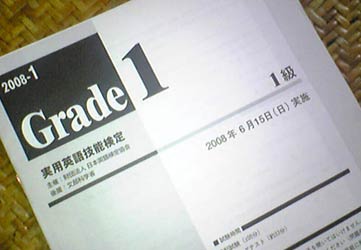“Where is your domicile?” This was what a Japanese man I ran into at a party asked me, by way of making small talk. It gave me pause because it’s not the clearest and most direct way to ask someone where they live, although it’s not grammatically wrong. There are quite a few instances where English-speakers living in Japan find themselves dealing with more complex words than they might be used to in their daily lives. When you go for a ride on the Shinkansen, there’s a sign in English asking passengers to avoid smoking in the vestibule, which I gather is what the area between the cars is called. Another English word I didn’t know before coming to Japan was “alight” meaning to exit a vehicle, which I encounter whenever I ride the bus to the airport. I guess the idea is that if you’ve gone out of your way to learn a language, there’s a tendency to want to use the longest and most complex words you can. And I’ve been guilty of this, too: I remember stubbornly writing every word I could in kanji even though my Japanese friends told me that they used simpler hiragana for those words instead.

Why learn difficult words if you’re not going to use them?















